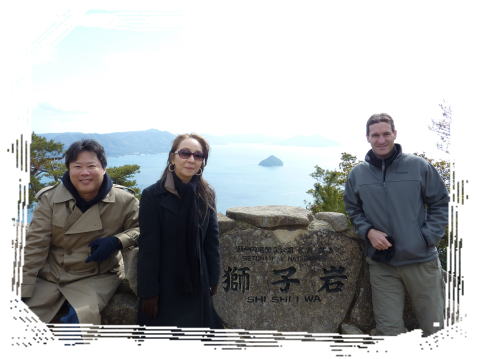Over the Years
Home > Over the Years > > Doctors and a Medical Student from Brazil and US (Hawaii) Invited for Training
Doctors and a Medical Student from Brazil and US (Hawaii) Invited for Training
Names and Titles of Trainees:
1. Lidia Mine Miyoshi, Physician
Internal Medicine, Santa Cruz Hospital
Period of training: January 30 to March 1, 2012
2. Randal Kai Wada, M.D.
Department of Pediatrics, Division of Hematology/Oncology,
John A. Burns School of Medicine, University of Hawaii
Period of training: February 13 to 17, 2012
3.Lucas Michael Dunklee, Medical Student
John A. Burns School of Medicine, University of Hawaii
Period of training: February 13 to 24, 2012
Training Organizations (in order of visits):
[Common for all three]
Hiroshima University Hospital (Advanced Emergency and Critical Care Center)
Hiroshima Red Cross Hospital & Atomic-bomb Survivors Hospital
Radiation Effects Research Foundation
Hiroshima Prefectural Medical Association
Hiroshima Atomic Bomb Casualty Council
Kurakake Nozomi-en (A-bomb survivors nursing home)
Hiroshima Peace Memorial Museum, etc.
[Only for trainees 1 and 3]
Hiroshima University Hospital (Department of Digestive Organs and Metabolic Medicine): Trainee 1
Hiroshima University Research Institute for Radiation Biology and Medicine: Trainees 1 and 3
International Symposium -50th Anniversary of RIRBM, Hiroshima University: Trainees 1 and 3
Training Course:
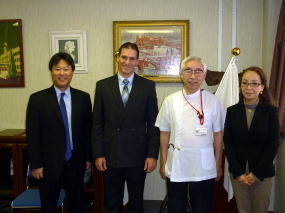
With President of HICARE Hiroo Dohy, (President, Hiroshima Red Cross Hospital & Atomic-bomb Survivors Hospital) (second from right)
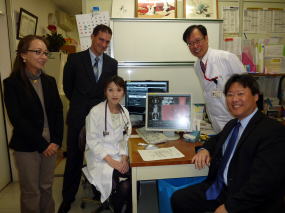
With Dr. Kenichi Arita, Director of Department of Respiratory Disease, Hiroshima Red Cross Hospital and Atomic-bomb Survivors Hospital (back row, far right)
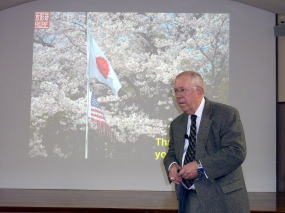
Lecture by Dr. Douple, Associate Chief of Research at the Radiation Effects Research Foundation
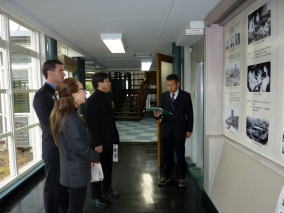
Inspection tour at Radiation Effects Research Foundation
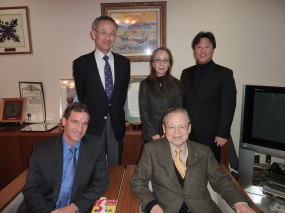
With Dr. Shizuteru Usui, President of Hiroshima Prefectural Medical Association (front row, far right) and Dr. Makoto Matsumura (back row, far left), Board Member of Hiroshima Prefectural Medical Association
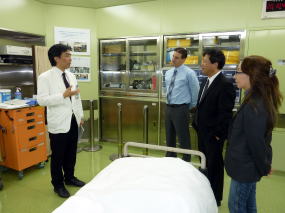
With Professor Koichi Tanigawa, Director of the Advanced Emergency and Critical Care Center, Hiroshima University Hospital (left)
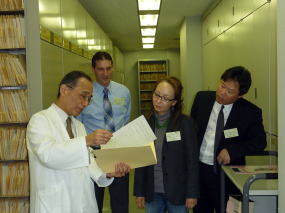
With Dr. Hideo Sasaki, Director of Health Management & Promotion Center, Hiroshima Atomic Bomb Casualty Council (left)
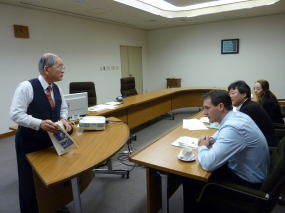
With Dr. Nanao Kamada, Board Chairman of Hiroshima A-Bomb Survivors Relief Foundation (left)
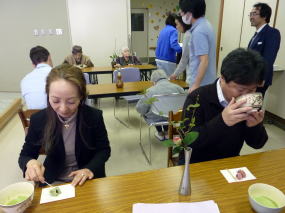
Trainees enjoying tea ceremony club of Kurakake Nozomi-en
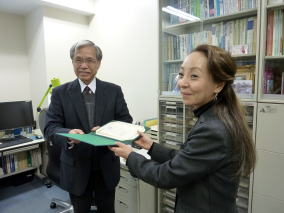
Dr. Miyoshi receiving the Certificate of Completion from Professor Fumio Suzuki on the last day of the training at Hiroshima University Research Institute for Radiation Biology and Medicine
Feedback:
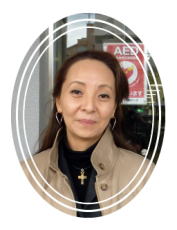
Dr. Lidia Mine Miyoshi
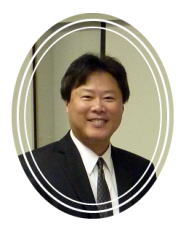
Dr. Randal Kai Wada
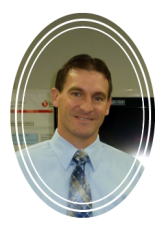
Mr. Lucas Michael Dunklee
- It's been a pleasure participating in HICARE's training to learn various medical techniques concerning the treatment of patients with radiation disorders. I was impressed by HICARE's contribution to international medical care for radiation-exposure victims based on their achievements in research activities concerning the effects that radiation has on A-bomb victims and other human bodies. I realized that even today, after 67 years have passed since the atomic bombing, survivors are still enduring physical, mental, and social suffering. I would like to support the victims and their families living outside Japan, using the knowledge and information that I have acquired through this training.
- My primary purpose of participating in the HICARE training was to enhance my insight and knowledge about responses to accidental exposure to radiation. Therefore, the lecture on the nuclear accident at Fukushima Daiichi Nuclear Station by Dr. Tanigawa from Hiroshima University Hospital was very beneficial and meaningful for me. In addition, I was so surprised by seeing the sophisticated technology and facilities of the Advanced Emergency and Critical Care Center. Despite the short period of time, all the lectures that I attended at the research institutions during the training were very valuable. I was impressed by knowing that the lecturers I met, have lavished their knowledge, devotion, and passion not only on the treatment of radiation disorders but also on the development of science and medicine and education for world peace.
